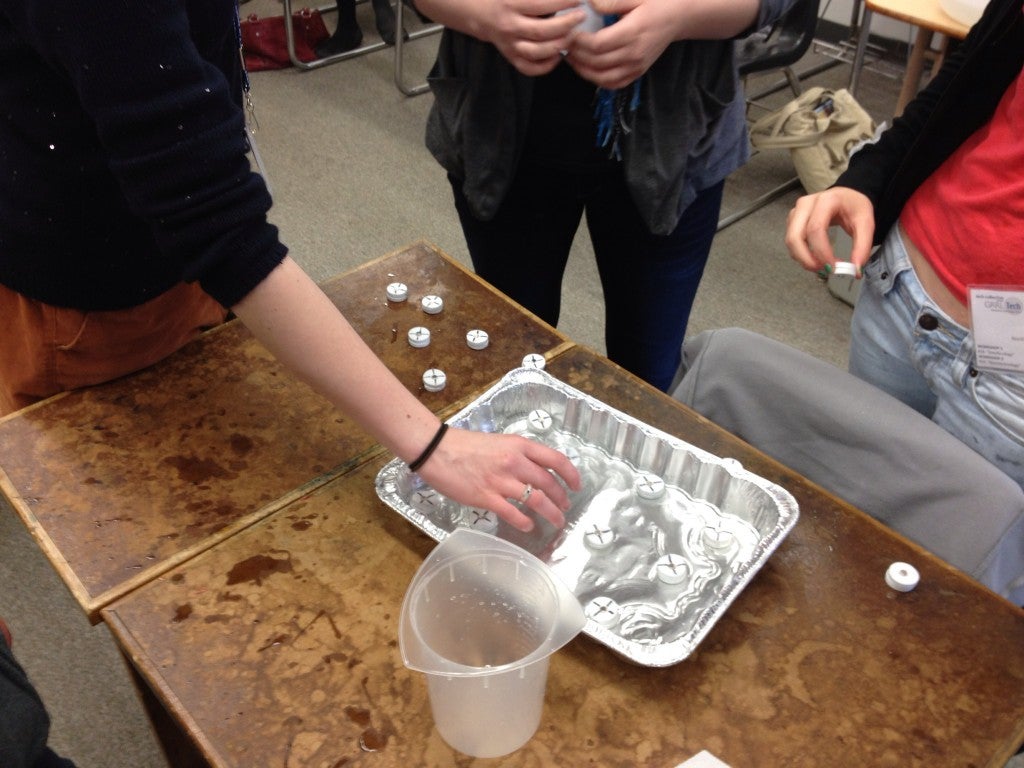“Nano” Education
EGR 450X: Nano Tools. Prof. Bothun and Prof. Vinka Oyanadel-Craver (with help from Arijit Bose) have joined forces to offer an undergraduate level course to introduce students to select cutting-edge instrumentation critical in the field of nanotechnology. The course, supported by the NSF Nanotechnology Undergraduate Education (NUE) program, seeks to enhance learning through hands-on, laboratory based activities coupled with independent research experiences and an understanding of the environmental, societal, and economic aspects associated with nanotechnology. This class was first offered in Spring 2014.
Nanotechnology at URI – Richard and Daniel discuss nanomedicine
Endless NANObilities – Celine discusses the nanoscale
A Need to Nano Basis – Kelson discusses nanotoxicology
Fighting Cancer in Little Ways – Rachel discusses cancer treatment
Nano Tools instructional videos (more coming soon!)
gold nanoparticle synthesis #1, #2, #3, #4, #5
CHE 550: Bionanotechnology. Prof. Bothun has offered this interdisciplinary graduate/undergraduate (professional elective) course since Spring 2007. The course, separated into two sections on “fundamentals” and “applications” of nanotechnology, couples traditional lectures with invited talks by academic/industry practitioners. Emphasis is given to student participation (peer-to-peer learning) and independent inquiry.
GCH 103: Grand Challenges in the Natural Sciences (What’s so Big about Small; an Introduction to Nanotechnology). Prof. Bothun developed this course in Fall 2010. Students are introduced to nanotechnology, specifically how it bridges the molecular and macro worlds (i.e. the macro world being our world) and how it is being used in the laboratory and commercially to design new products and processes that will impact every educational and economic sector. Because it deals with ‘small things’ with dimensions similar to proteins and cells, nanotechnology poses both benefits and risks. Students will learn what these benefits and risks are, how state and federal entities are balancing benefit and risk, and how to communicate nanotechnology, in particular this balance, to the public and non-science audiences.
BPS/CHE 204G: Nanotechnology: It’s a Small World. Prof. Jyothi Menon in Biomoedical & Pharmaceutical Sciences and Prof. Bothun developed this course in Fall 2019. This General Education Grand Challenge course introduces students to the fundamentals and applications of nanotechnology, and provides a basic understanding of how to evaluate the working principles, benefits, and risks of nano-enabled products and technologies. In particular, this course will focus on how nanotechnology is changing the way we as a society and as consumers engage with technology in a responsible manner, and how we as informed citizens can be effective and inclusive in how we communicate these changes to the public and non-science audiences.
Research Training and Professional Development
EXperimental Program for Education through Research and Training (EXPERT). Working with the National Science Foundation Science and Technology Center for Environmentally Responsible Solvents and Processes, Prof. Bothun created the EXPERT program at North Carolina Agricultural & Technical State University. EXPERT was designed to enhance the undergraduate experience and career preparedness, and to increase the number of underrepresented students in science and engineering, particularly at the graduate level. An article describing the original inception of EXPERT can be found in Science Careers.
Outreach
Lego® AFM. Based on the excellent work by Prof. Keunhan Park at the University of Utah, Profs. Bothun and Craver are working with undergraduate students to create a Lego® AFM for grades 6-12 outreach and as a demonstration tool for illustrating “nano tools” to undergraduate students.
Engineering for Seniors (September 2014). Prof. Bothun had the opportunity to discuss his research in nanomedicine to senior citizens at the Greenwich Bay Retirement Living and EPOCH Assisted Living communities. This included a picture of “what medicine is like today” and “what medicine could look like in the future.” Additional discussions involved research activities at URI and the College of Engineering’s building bond that was approved on November 4th, 2014 (thank you Rhode Islanders!).
Chemistry camp for girls (April 2013). Prof. Bothun presented an introduction to nanotechnology to inspire middle-school girls in STEM fields in an event organized by Prof. Mindy Levine in the URI Chemistry Department.
Girls Reaching Remarkable Levels (GRRL Tech) (March 2012, 2013). With some expert help from Eily Cournoyer, Anju Gupta, Aihong Xi, and Matt Preiss, the Bothun Lab hosted a workshop, Nanotechnology: What’s so big about small?, for GRRL Tech at URI. GRRL Tech exposes female high school students to STEM fields and undergraduate/career opportunities. Sixty students conducted a hands-on activity with “floating magnets” to illustrate the concept of self-assembly and how this concept is found in nature and can be used to create nanomaterials that can help solve global challenges. Supported by NSF CAREER Grant (CBET-1055652).


